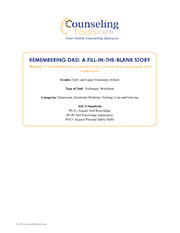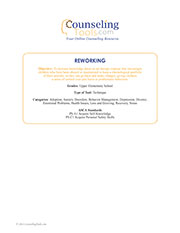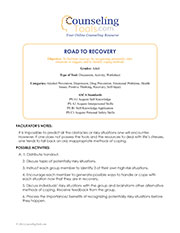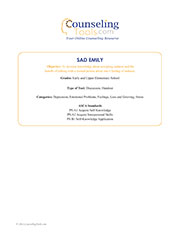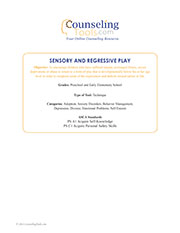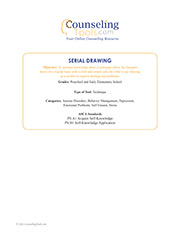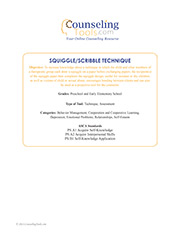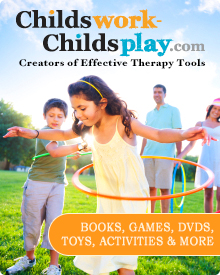-
-
TopicsDepression, Emotional Problems, Feelings, Loss & Grieving
- Objective
To help children learn to cope with the loss of a loved one by suggesting the use of a memory box.
- Types of ToolsTechnique, Worksheet
- GradesEarly Elementary School, Upper Elementary School
- ASCA StandardsPS:A1: Acquire Self-Knowledge, PS:B1 Self-Knowledge Application, PS:C1 Acquire Personal Safety Skills
- Number of pages2
-
-
-
TopicsAdoption, Anxiety Disorders, Behavior Management, Depression, Divorce, Emotional Problems, Health Issues, Loss & Grieving, Recovery, Stress
- Objective
To increase knowledge about an art therapy concept that encourages children who have been abused or traumatized to keep a chronological portfolio of their artwork, so they can go back and make changes, giving children a sense of control over past hurts or problematic behaviors.
- Types of ToolsTechnique
- GradesUpper Elementary School
- ASCA StandardsPS:A1: Acquire Self-Knowledge, PS:C1 Acquire Personal Safety Skills
- Number of pages2
-
-
-
TopicsAlcohol and Drug Prevention, Depression, Emotional Problems, Health Issues, Positive Thinking, Recovery, Self-Injury
- Objective
To facilitate recovery by recognizing potentially risky situations or triggers, and to identify coping methods.
- Types of ToolsActivity, Discussion, Worksheet
- GradesAdult
- ASCA StandardsPS:A1: Acquire Self-Knowledge, PS:A2 Acquire Interpersonal Skills, PS:B1 Self-Knowledge Application, PS:C1 Acquire Personal Safety Skills
- Number of pages3
-
-
-
TopicsDepression, Emotional Problems, Feelings, Loss & Grieving, Stress
- Objective
- Types of ToolsDiscussion, Handout
- GradesEarly Elementary School, Upper Elementary School
- ASCA StandardsPS:A1: Acquire Self-Knowledge, PS:A2 Acquire Interpersonal Skills, PS:B1 Self-Knowledge Application
- Number of pages3
-
-
-
TopicsAnger Management, Anxiety Disorders, Depression, Emotional Problems, Feelings, Positive Thinking, Self-Control, Self-Esteem, Spirituality
- Objective
To increase knowledge about a technique in which children learn to lower their body-arousal state and inhibit aggressive impulses by practicing calming alternatives to manage their anger.
- Types of ToolsTechnique
- GradesEarly Elementary School, High School, Middle School, Upper Elementary School
- ASCA StandardsPS:A1: Acquire Self-Knowledge, PS:A2 Acquire Interpersonal Skills, PS:B1 Self-Knowledge Application, PS:C1 Acquire Personal Safety Skills
- Number of pages4
-
-
-
TopicsAdoption, Anxiety Disorders, Behavior Management, Depression, Divorce, Emotional Problems, Self-Esteem
- Objective
To encourage children who have suffered trauma, prolonged illness, severe deprivation, or abuse to return to a form of play that is developmentally below his or her age level in order to recapture some of the experiences and deficits missed earlier in life.
- Types of ToolsTechnique
- GradesEarly Elementary School, Preschool
- ASCA StandardsPS:A1: Acquire Self-Knowledge, PS:C1 Acquire Personal Safety Skills
- Number of pages2
-
-
-
TopicsAnxiety Disorders, Behavior Management, Depression, Emotional Problems, Self-Esteem, Stress
- Objective
To increase knowledge about a technique where the therapist meets on a regular basis with a child and simply asks the child to use drawing as a symbol to express feelings and problems.
- Types of ToolsTechnique
- GradesEarly Elementary School, Preschool
- ASCA StandardsPS:A1: Acquire Self-Knowledge, PS:B1 Self-Knowledge Application
- Number of pages3
-
-
-
TopicsBehavior Management, Depression, Emotional Problems, Relationships, Self-Esteem
- Objective
To increase knowledge about a technique in which the child and other members of a therapeutic group each draw a squiggle on a paper before exchanging papers; the recipient(s) of the squiggle paper then completes the squiggle design; useful for resistant or shy children, as well as victims of child or sexual abuse; encourages bonding between clients and can also be used as a projective tool for the counselor.
- Types of ToolsAssessment, Technique
- GradesEarly Elementary School, Preschool
- ASCA StandardsPS:A1: Acquire Self-Knowledge, PS:A2 Acquire Interpersonal Skills, PS:B1 Self-Knowledge Application
- Number of pages2
-
-
-
TopicsDepression, Emotional Problems, Feelings, Loss & Grieving, Positive Thinking, Recovery
- Objective
- Types of ToolsAssessment, Worksheet
- GradesAdult, High School, Middle School
- ASCA StandardsPS:A1: Acquire Self-Knowledge, PS:A2 Acquire Interpersonal Skills, PS:B1 Self-Knowledge Application, PS:C1 Acquire Personal Safety Skills
- Number of pages3
-
-
-
TopicsDepression, Emotional Problems, Feelings, Health Issues, Loss & Grieving, Stress
- Objective
To provide information about the myths and facts of recognizing and treating depression and suicide.
- Types of ToolsWorksheet
- GradesAdult, High School
- ASCA StandardsA:A1 Improve Academic Self-Concept, PS:A1: Acquire Self-Knowledge, PS:C1 Acquire Personal Safety Skills
- Number of pages2
-
- Home
- Topics
- ADD/ADHD
- Adoption
- Alcohol and Drug Prevention
- Anger Management
- Anxiety Disorders
- Asperger's Syndrome
- Assertiveness
- Autism Spectrum
- Behavior Management
- Body Image
- Bullying and Cyberbullying
- Career Exploration
- Character Education
- Classroom Issues
- Cliques
- Communication
- Types of Tools
- Grades
- ASCA Standards
- A:A1 Improve Academic Self-Concept
- A:A2 Acquire Skills for Improving Learning
- A:A3 Achieve School Success
- A:B1 Improve Learning
- A:B2 Plan to Achieve Goals
- A:C1 Relate School to Life Experiences
- C:A1 Develop Career Awareness
- C:A2 Develop Employment Readiness
- C:B1 Acquire Career Information
- C:B2 Identify Career Goals
- C:C1 Acquire Knowledge to Achieve Career Goals
- PS:A1: Acquire Self-Knowledge
- PS:A2 Acquire Interpersonal Skills
- PS:B1 Self-Knowledge Application
- PS:C1 Acquire Personal Safety Skills
- About Us
- Contact Us


 Post Forms here
Post Forms here
